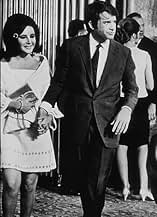Frank D. Gilroy adapted his unsuccessful two-act play about an aging Las Vegas showgirl (Elizabeth Taylor) who picks up the piano player (Warren Beatty) in a cocktail lounge one night after work. He's a gambler who can't be trusted with money; she's on the rebound after her married lover returned to his wife. It's an oddly old-fashioned tale with nothing particularly dramatic in the set-up; the pressing issues seem to be her loneliness and his need to win big. The critics pounced on the picture, not because of Gilroy's writing or George Stevens' direction or the performances--but because of the budget ($11M), inflated by Taylor's insistence the film's interiors be shot in Paris, France (so she could be close to husband Richard Burton). Despite the wigs and insistent soft-focus close-ups, Taylor comes close to finding an interesting character here; she isn't convincing as a showgirl (shot from the shoulders up), and she doesn't exactly sizzle with Beatty, but she's easily bruised and vulnerable, and lovely when she needs to be. Beatty (filling in for Frank Sinatra, who had prior commitments) plays his dryly sarcastic role with a touch of eccentricity; he's supposed to be younger and reckless, a wild card, but some scenes--like a hopeless fishing excursion at Lake Mead (using a green screen)--are beyond his control. The color scheme of Taylor's apartment (where we're stuck most of the time)--in avocado green and gold--isn't glamorous, but the rest of the movie is. Cinematographer Henri Decae gives the picture a touch of fake-Vegas sparkle which is appealing, and all the exteriors on-location look terrific (Las Vegas becomes a big, shiny department store). What doesn't work is the back-end of Gilroy's second act, wherein Taylor hesitates over Beatty's marriage proposal. Their conversation is supposed to be a dissection of why men and women marry, what keeps them together and why the participants eventually get restless--but it goes on and on, grinding the movie to a halt. Had Stevens (whose last film this was) given us something more--a final visual zinger or a twist--"The Only Game In Town" may actually be worth a second glance. As it is, it fades in the stretch as well as in the memory. **1/2 from ****
























